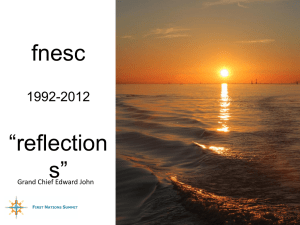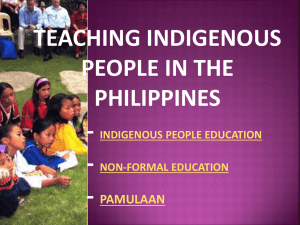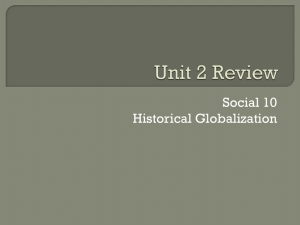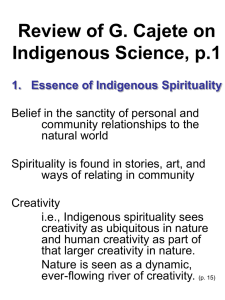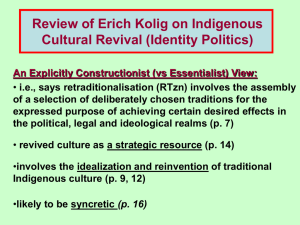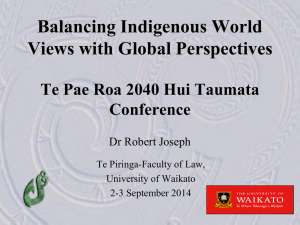Decolonizing Methodologies-additional notes on Smith
advertisement
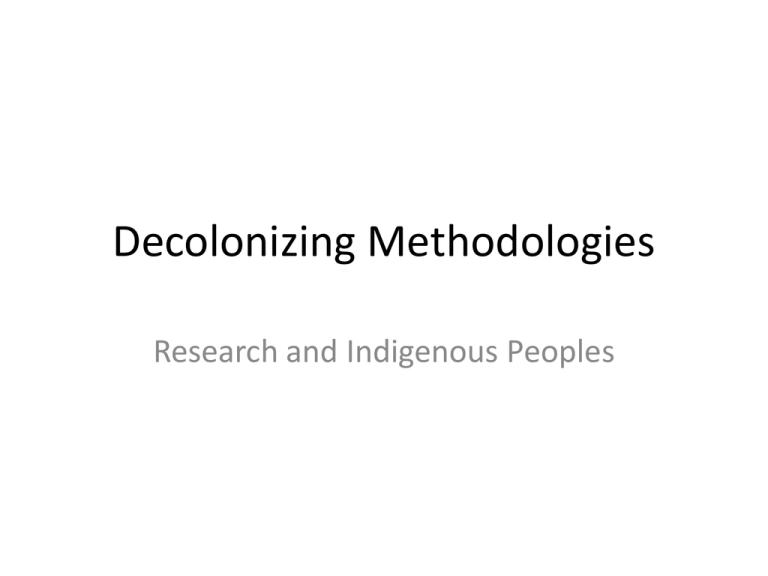
Decolonizing Methodologies Research and Indigenous Peoples Introduction • The term research is one of the ‘dirtiest’ words in the indigenous world’s vocabulary • It is linked to European imperialism and colonialism • “It appals us that the West can desire, extract and claim ownership of our ways of knowing, our imagery, the things we create and produce, and then simultaneously reject the people who created and developed those ideas and seek to deny them further opportunities to be creators of their own culture and own nations.” (1) • “research is one of the ways in which the underlying code of imperialism and colonialism is both regulated and realized.” (7) How it works to deny • Through a collective memory about the ways in which knowledge about indigenous peoples was collected, classified, and then represented back to the West- AND then- through the eyes of the West- retold back to those who have been colonized. • This is what Said called in Orientalism the Western discourse about the other. • For Said: this is supported by: “institutions, vocabulary, scholarhsip, imagry, doctrines, even colonial beaurocracies and colonial styles.” (Said, 2) Smith’s Argument • Smith argues that the CURRENT material conditions of poverty, inequality, chronic ill health, and poor educational opportunities are part of a larger HISTORICAL narrative • This narrative is one of European Imperialism and Colonialism • One that is as ideological as it is factual • One that is as powerful now as it was a century ago • One that is as “hidden” in academic pursuits of research and the classification of knowledge as it is “obvious” in the everyday lives of idigenous people today in both the West and in Developing Nations Is this a dead end? Has the story already been told? • Smith argues that Indigenous communities have other stories to tell- alternate histories• Stories that differ from Western categories of knowledge and distinction • What she calls “counter stories” (2) “To acquiesce is to lose ourselves entirely and implicitly agree with all that has been said about us. To resist is to retrench the margins, retrieve what we were and remake ourselves. The past, our stories local and global, the present, our communities, cultures, languages and social practices –a all may be spaces of marginalization, but they have also become spaces of resistance and hope.” (4) • “I would argue that ‘we’, idigenous peoples , people of ‘colour’, the Other, however we are named, have a presence in the Western imagination, in its fibre and texture, in its sense of itself, in its language, in its silences and shadows, its margins and intersections.” (14) So then, how do we research? • Research with indigenous communities posing a number of insider/outsider issues • Research is NOT simply an innocent and academic pursuit. It is always a reflection of the social and political ideologies of the institutions (and individuals) who design, request, support, fund, oversee, participate in, and ultimately publish the research project. • RESEARHC IS AN ACTIVE space. And that means it is then a space of contestation. It is not simply something we just do. • We cant erase the barriers of distinction and the social expectations and myths that accompany these. AND therefore as researchers, we must acknowledge them, make them overtly known, and then work to create a space of dialogue in spite of difference that acknowledges the ackwardness of power, represenationa, and reality- instead of a research paradigm that seeks to hide these in the pursuit of a more “trithful” or “expressive” research environment. • Insiders are just that- Outsiders too. This is why we must take “the most adult status.” The term “indigenous peoples” • Smith acknowledges that the term “indigenous” is problematic because it universalizes many distinct groups of people under one collective heading. • And that many of the groups referred to as indigenous have themselves used different terms to name themselves- and they have experienced different relationships and histories under imperialism. So why use it? • The term itself is recent. • Emerged in 1970s in Canada/US out of the American Indian Movement and Canadian Indian Brotherhood (7) • Its a term that suggests that the local struggles of marginalized groups/populations are part of larger global struggles. • Hence the (s) on - peoples. To (a) allow for selfdetermination and also to (b) remind us that the local experiences differ BUT still remain connected Conducting research • Questions to ask and consider in the research process (taken verbatim from p. 10): 1. Whose research is it? 2. Who owns it? 3. Whose interests does it serve? 4. Who will benefit from it? 5. Who has designed its questions and framed its scope? 6. Who will carry it out? 7. Who will write it up? 8. How will its results be disseminated? Disseminating the research Smith argues that the pricess of disseminating hte knowledge also nees to be culturally sensitive and appropriate- to ensure that the research reaches the people who helped to make it! (15) • Reporting back – Its not a one off – You need to bring it back to them • Sharing knowledge – Its not just about pamphlet type distribution but about a collective interaction- a long term and ongoing dialouge. Notes for further work Ch 2 • Stuart halls defn of the west: p,.42 • Instead of core vs periphery: how about the line, the centre, and the outside p. 53 • Defn of research through imperial eyes p. 56 • Summary of ch 2. p57 Notes for further work • Ch 3• Discussion of colonizing of knowledge and the mind p. 59 • What is authenticity and essentialism (72) • And the ways in which these terms take on different and antithetical values as spaces of resistance in indigenous cultures (73-73) Notes for further work • Ch4 • The application of travelling theory/tourism/and voyeurism to unpacking the imperialism of indigenous peoples p.78/79) • The naming of the word and of the world (81) • Trading the other- as the first form of globalization (88-90) • Defn of “the indigenous problem” (90-91) • “Problematizng the indigenous is a Western obsession.” (91) AND how this frames the research agenda and hides the history, structural policies and ideologies at play in the marginalization of indigenous peoples. (92) Notes for further work • Ch 5 • The problem with “post colonial” is that is suggests the colonizer has left! (98-99) • The argument that “technology as saviour” in current politicla discourse is what contineusto place indigenous peoples on the margin- in that indigenous cultures sees the planet as a living entity. • “the language of imperialism may have changed, the specific targets of colonization may have shifted and indigenous groups may be better informed, but imperialism still exists. (100)- see pp100-103 “10 ways to be researched (colonized)” *in particular #10 Notes for further work • • • • Ch 6 Defn of what is idigenous research (107) Defn of what makes an indigenous peoples project (110) Defn of the research agenda for indigenous projects (115117) • A list of Kaupapa Maori practices –suggestions for ethical research (120) – all based on respect • “The denial by the West of humanity to indigenous peoples, the denial of citizenship and human rights, the denial of the right to self-determination – all these demonstrate palpably the enormous lack of respect which has marked the relations of indigenous and non-indigenous peoples.” (120) Notes for further work • Ch 7 • 2 distinct pathways through which an indigenous research project are advanced community action projects and research centres. They are not mutually exclusive but are intertwined and inform each other at a number of different levels (125) • Community action projects (125-128) • *there is an emphasis on process not results with PROCESS defined as “methodology AND method” (128) • Research Centres ( 129-134: no need to re-read its a case study) • On the ethics and practices of soliciting consent in the research process (136) • On negotiating an entry point into the culture (137) • On being an insider and an outsider in the research process (137-140) in particular a great example of being reflexive on your own outsider status see p. 138, and a nice discussion on insider as authority? On p. 139 • On why indigenous research is a highly political activity (140) Notes for furtherwork • Ch 8 • A great overview ofwhat is indigenous research (142) • The defn of method vs methodology (143) • Examples of 25 indigenous projects (143-161) in particular #12 (p150-151) on “representing” and #18 (p.156) on democraticizing Notes for further research • • • • Ch 9 Defn of positivism (164) A different but very good defn of method vs methodology (164) Questions of critical theory being asked at the ground level- great quote (165) • Post positivism (167) • On the point of whose knowledge? And representation vs reality: “the problem is not simply about redressing the past. Much of what has been written about the Maori people... Has become part of a body of common knowledge that is take for granted. Hence the uphill task is ...to challenge existing knowledge that is primarily ideological or false.” (170) • “the whole process of colonization can be viewed as a stripping away of our mana (our standing in our own eyes) and an undermining of our rangatiratanga (our ability and right to determine our destinies). Research is an important part of the colonization process because it is concerned with defining legitimate knowledge.” (173) Ch 9 cont. • On research methodology and its purpose and role (173) • The questions that need to be asked: – – – – – – – – – Who defined the research problem? For Whom is this study worthy and relevant? Who says so? What knowledge and community will gain from this study? What knowledge will the researcher gain form this study? What are some likely positive outcomes from this study? What are some possible negative outcomes? How can the negative outcomes be eliminated? To whom is the researcher accountable? What processes are in place to support the research, the researched, and the researcher? (173) Ch 9 cont • On the role of the researcher taking the most adult status and the responsibility of the researcher to do so (176) • Graham Smith’s four models for research which is culturally appropriate for non indigenous researchers: 1. 2. 3. 4. • • The mentoring model The adoption model The power sharing model Empowering outcomes model (177) The dangers and failures of the empowering outcomes model (178) Defn of Bicultural or partnership research (178) Notes for further research • ch 10 • On the successes or failures of critical theory to the Kaupapa Maori research projects (186, 188) • Anti-postivist/the most adult status (186-187) • “The problem is not just that the positivist science is well established institutionally and theoretically, but it has a connectedness at a common sense level with the rest of society who, generally speaking, take for granted the hegemony of its methods and leadership in the search of knowledge. As far as many people are concerned, research is positivist; it cannot be anything else.” (189) Final thoughts • Smith ends the book (in ch 10) with a line that so perfectly sums up exactly WHY the role of children in institutions like education and more specifically politics MUST change: • “When indigenous peoples become the researchers and not merely the researched, the activity of research is transformed. Questions are framed differently, priorities are ranked differently, problems are defined differently, people participate on different terms.” (193). • Or as she articulates in her conclusion: • “how can research ever address our needs as indigenous peoples if our questions are never taken seriously?” (198)


